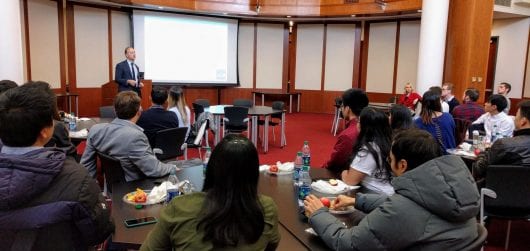
Bart Édes, North-American representative of the Asian Development Bank, givies a talk at the Fisher College of Business on Nov. 8. Credit: Global Business Association
Bart Edes, the North American representative of the Asian Development Bank, came to the Fisher College of Business on Thursday to explain the role of the organization he works for and provide insight on the trade disagreements between the United States and China.
The talk was organized by the Global Business Association, a student organization whose goal is to bring an international perspective to Fisher. Isaac Reynolds, a first-year MBA candidate and president of GBA, said Edes brought a new perspective to attendees.
“Sometimes when we’re in the classroom we’re too theoretical,” Reynolds said. “Having this kind of access [to professionals], in this high-level macro perspective, brings everything together.”
Reynolds said this was the first forum organized at the business school focused on Asia, which he said represents “massive growth.”
Edes said the ADB, founded in 1966, is both a multilateral development bank and an international organization. He said it provides financing, knowledge and capacity building to developing countries in Asia and the Pacific, with the purpose of promoting prosperity, inclusiveness, resilience and sustainability.
When asked if the ADB could be considered the little sister of the World Bank, Edes said, “We could say we’re sisters but doing $20 billion of financing in Asia and the Pacific last year, there’s nothing little about it.”
The U.S. and Canada share 21 percent of the ADB, Edes said. The North American office of the ADB, based in Washington, D.C., promotes commercial relationships with the Asian-Pacific region and allows North American companies to bid on contracts.
However, the relationship between the U.S. and China has been tense recently, Edes said.
“This is a bilateral matter between the two governments,” Edes said. “We are watching with interest and concern. We hope that there will be a swift resolution to the disagreements.”
Edes said potential impacts of these tensions might include trade diversion, meaning redirection of exports, imports and investments to other countries in the region, which would benefit them in the short term.
“Right now the impacts have been relatively small, but there’s the potential for them to become more serious … it should be a concern for everyone,” Edes said.
Another mission of the ADB is to reduce poverty, specifically through soft areas such as education, health and social protection, all of which need basic infrastructure to function properly.
“Without infrastructure, you are limiting a country’s potential for economic growth … you limit the investment that’s required to create jobs that lift people out of poverty,” Edes said.
For example, infrastructures may include roads and bridges, for which the ADB not only finances the cost of construction, but also recruits the engineers and workers needed, both locally and internationally, Edes said.
In fact, it is also one of the missions of the representative to recruit ADB staff for the headquarters in Manilla, Philippines.
“We would be really happy to see OSU graduate students applying for internships,” Edes said. “I’ve found [it] really interesting to engage with OSU and explore the possibility of future cooperations.”
The ADB offers an average of 30 internships per year, which are open to students of any of the ADB’s member states. Edes said this program is very competitive and open only to graduate students.


